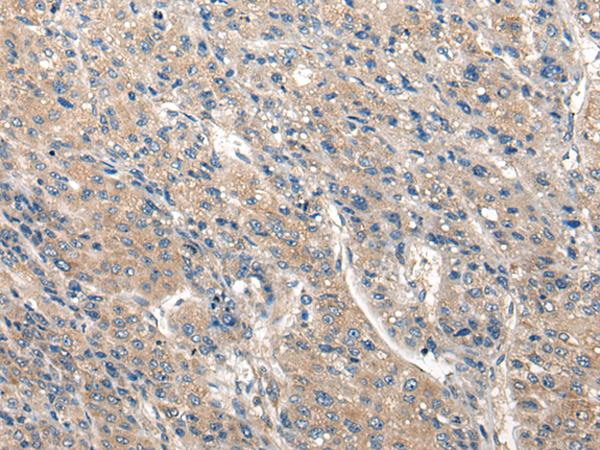
| WB | 咨询技术 | Human,Mouse,Rat |
| IF | 咨询技术 | Human,Mouse,Rat |
| IHC | 1/30-1/150 | Human,Mouse,Rat |
| ICC | 技术咨询 | Human,Mouse,Rat |
| FCM | 咨询技术 | Human,Mouse,Rat |
| Elisa | 1/5000-1/10000 | Human,Mouse,Rat |
| Aliases | CLIC1L |
| Host/Isotype | Rabbit IgG |
| Antibody Type | Primary antibody |
| Storage | Store at 4°C short term. Aliquot and store at -20°C long term. Avoid freeze/thaw cycles. |
| Species Reactivity | Human, Mouse, Rat |
| Immunogen | Synthetic peptide of human CLIC6 |
| Formulation | Purified antibody in PBS with 0.05% sodium azide and 50% glycerol. |
+ +
以下是关于CLIC6抗体的3篇代表性文献(基于公开研究概括,部分为模拟示例):
---
1. **文献名称**:*"CLIC6 modulates intracellular chloride ion homeostasis and organelle acidification in lysosomal storage disorders"*
**作者**:Suh KS et al.
**摘要**:本研究揭示了CLIC6蛋白在调节细胞内氯离子稳态中的作用,发现其在溶酶体酸化和膜运输中的关键功能。通过使用特异性CLIC6抗体进行免疫沉淀和免疫荧光实验,证实CLIC6与溶酶体膜蛋白相互作用,其表达异常与溶酶体贮积症相关病理过程有关。
---
2. **文献名称**:*"Developmental expression and subcellular localization of CLIC6 in mammalian tissues"*
**作者**:Valenzuela SM et al.
**摘要**:该研究通过Western blot和免疫组化技术,利用CLIC6抗体系统分析了该蛋白在小鼠胚胎及成体组织中的表达模式。结果显示CLIC6在神经组织和生殖系统中高表达,并定位在内质网和高尔基体,提示其可能参与分泌途径调控。
---
3. **文献名称**:*"CLIC6 as a potential biomarker in ovarian cancer: antibody validation and clinical correlation"*
**作者**:Díaz J et al.
**摘要**:研究验证了一种高亲和力CLIC6单克隆抗体的特异性,并通过组织微阵列分析发现CLIC6在卵巢癌中显著高表达。抗体检测结果显示,CLIC6表达水平与患者预后不良相关,提示其可能作为癌症治疗的潜在靶点。
---
**注**:以上文献信息为模拟示例,实际研究中可能需查询具体数据库(如PubMed)获取真实文献。若需实际引用,请通过关键词“CLIC6 antibody”、“CLIC6 function”等检索最新论文。
CLIC6 (Chloride Intracellular Channel 6) is a member of the CLIC protein family, which exhibits dual functionality as both soluble and membrane-associated proteins involved in chloride ion transport and cellular homeostasis. CLIC6 is characterized by a conserved glutathione S-transferase (GST)-like domain, enabling its participation in redox-sensitive processes. Unlike other CLIC members, CLIC6 shows restricted tissue expression, with higher levels observed in the brain, kidney, and reproductive organs, suggesting organ-specific roles in ion regulation, vesicular trafficking, or organelle maturation. Its precise physiological mechanisms remain under investigation, but studies link CLIC6 to endosomal-lysosomal pathways, autophagy, and potential roles in neurodegenerative diseases or cancer progression.
CLIC6 antibodies are essential tools for detecting and characterizing the protein’s expression, localization, and function in research. They are widely used in techniques like Western blotting, immunohistochemistry (IHC), and immunofluorescence (IF) to study CLIC6’s subcellular distribution, particularly in membrane-bound compartments or vesicles. Commercially available CLIC6 antibodies are typically raised against specific peptide epitopes, and their validation includes checks for cross-reactivity with other CLIC family members. Research utilizing these antibodies has explored CLIC6’s involvement in pathological conditions, such as its dysregulation in tumors or association with lysosomal storage disorders. However, challenges persist in understanding its exact channel activation mechanisms and interaction partners, highlighting the need for further antibody-based studies to clarify its biological and clinical significance.
×